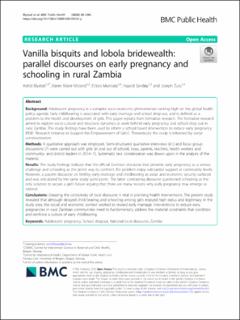| dc.contributor.author | Blystad, Astrid | |
| dc.contributor.author | Moland, Karen Marie Ingeborg | |
| dc.contributor.author | Munsaka, Ecloss | |
| dc.contributor.author | Sandøy, Ingvild Fossgard | |
| dc.contributor.author | Zulu, Joseph Mumba | |
| dc.date.accessioned | 2021-06-17T12:35:03Z | |
| dc.date.available | 2021-06-17T12:35:03Z | |
| dc.date.created | 2020-10-01T13:07:14Z | |
| dc.date.issued | 2020 | |
| dc.identifier.issn | 1471-2458 | |
| dc.identifier.uri | https://hdl.handle.net/11250/2759995 | |
| dc.description.abstract | Background
Adolescent pregnancy is a complex socio-economic phenomenon ranking high on the global health policy agenda. Early childbearing is associated with early marriage and school drop-out, and is defined as a problem to the health and development of girls. This paper reports from formative research. The formative research aimed to explore socio-cultural and structural dynamics at work behind early pregnancy and school drop out in rural Zambia. The study findings have been used to inform a school based intervention to reduce early pregnancy (RISE: ‘Research Initiative to Support the Empowerment of Girls’). Theoretically the study is informed by social constructionism.
Methods
A qualitative approach was employed. Semi-structured qualitative interviews (61) and focus group discussions (7) were carried out with girls (in and out of school), boys, parents, teachers, health workers and community- and district leaders in 2014–15. Systematic text condensation was drawn upon in the analysis of the material.
Results
The study findings indicate that the official Zambian discourse that presents early pregnancy as a serious challenge and schooling as the prime way to confront the problem enjoy substantial support at community levels. However, a parallel discourse on fertility, early marriage and childbearing as social and economic security surfaced and was articulated by the same study participants. The latter contrasting discourse questioned schooling as the only solution to secure a girl’s future arguing that there are many reasons why early pregnancy may emerge as rational.
Conclusions
Grasping the complexity of local discourse is vital in planning health interventions. The present study revealed that although delayed child bearing and schooling among girls enjoyed high status and legitimacy in the study area, the social and economic context worked to reward early marriage. Interventions to reduce early pregnancies in rural Zambian communities need to fundamentally address the material constraints that condition and reinforce a culture of early childbearing. | en_US |
| dc.language.iso | eng | en_US |
| dc.publisher | BMC | en_US |
| dc.rights | Navngivelse 4.0 Internasjonal | * |
| dc.rights.uri | http://creativecommons.org/licenses/by/4.0/deed.no | * |
| dc.title | Vanilla bisquits and lobola bridewealth: parallel discourses on early pregnancy and schooling in rural Zambia | en_US |
| dc.type | Journal article | en_US |
| dc.type | Peer reviewed | en_US |
| dc.description.version | publishedVersion | en_US |
| dc.rights.holder | Copyright The Author(s). 2020 | en_US |
| dc.source.articlenumber | 1485 | en_US |
| cristin.ispublished | true | |
| cristin.fulltext | original | |
| cristin.qualitycode | 1 | |
| dc.identifier.doi | 10.1186/s12889-020-09555-y | |
| dc.identifier.cristin | 1836178 | |
| dc.source.journal | BMC Public Health | en_US |
| dc.relation.project | Norges forskningsråd: 223269 | en_US |
| dc.relation.project | Norges forskningsråd: 248121 | en_US |
| dc.identifier.citation | BMC Public Health. 2020, 20, 1485. | en_US |
| dc.source.volume | 20 | en_US |

